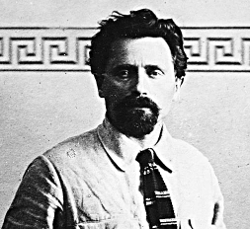




|
Solomon
Lozovsky
(1878-1952)  Russian revolutionary, he
was born in Ukraine to Jewish parents. Lozovsky joined the
Russian Social Democratic Party in 1901 and a long series of
arrests and exiles followed. After the split in the party he
sided with the Bolsheviks, however he was expelled in 1914 due
to his advocacy for reuniting the parties different factions.
After returning to Russia from exile and participating in the
October Revolution, he was readmitted to the party in 1917.
Soon after, however, in 1918, he was newly expelled for his
support for independent trade unions and his advocacy for a
government open to the left, not just the Bolsheviks. Lozovsky
was readmitted in 1919 and from then on ceased criticism of
the party's line. From 1920 to 1937 he was the general
secretary of the Profintern, the union of communist unions
tied to the Comintern. During WWII he had a major role in
leading the anti-fascist and anti-racist propaganda. After the
war in 1949, at the beginning of another of Stalin's seasons
of repression and paranoia, Lozovsky was arrested and
sentenced to death. Lozovsky refused to admit to invented
crimes, or accuse others, and acted with supreme dignity and
courage during his trial. Lozovsky was executed on 12 August
1952.
Marx
and the Trade Unions (1933): 184 pages. A collection and
analysis of Marx and Engels views on trade unions. This book
deals with the general ideas of the role of unions in the class
struggle, as well as Marx's polemics with Proudhon and Bakunin
in relation to trade unions. It discusses Marx and Engels'
opinions on the labor movements in England, France and amerika,
as well as their views of strikes and reformist unions. Finally,
Lozovsky points out the need for trade unions to be actively
political, and in specific communist in ideology, and reaffirms
the importance of trade unions engaging in political, as well as
economic struggles.
|